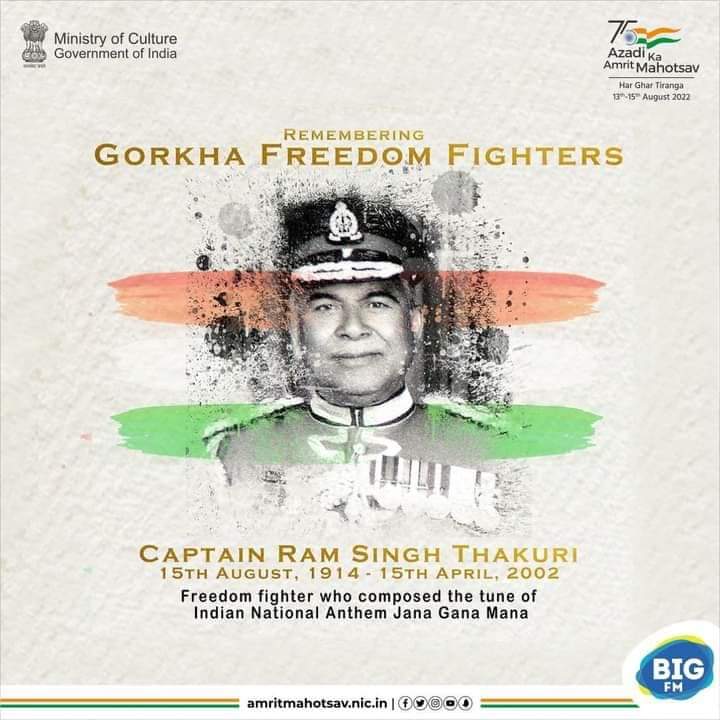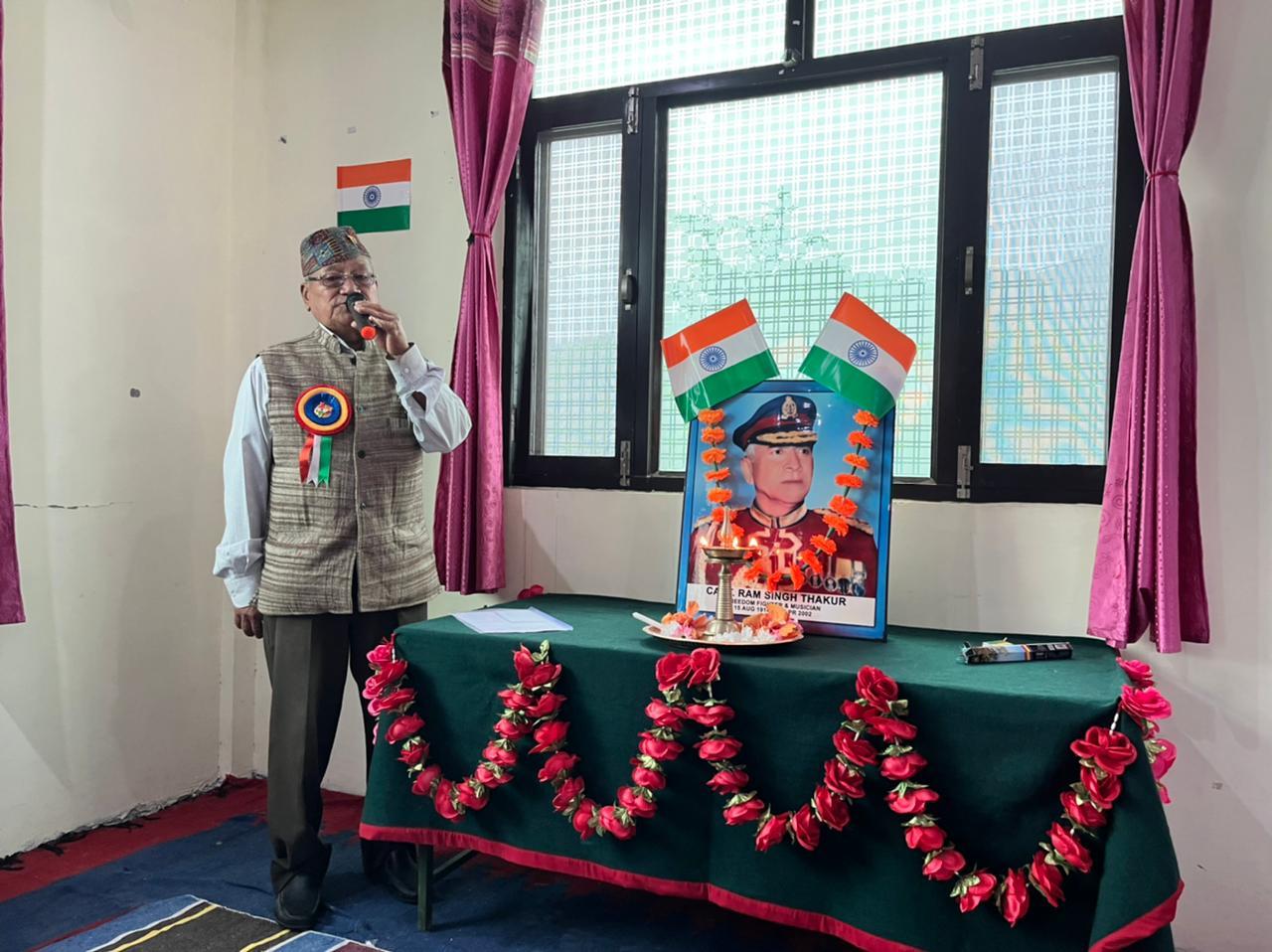Padumpathar, Golaghat Assam: The 76th Independence Day was celebrated with spirit of ‘Azadi Ka Amrut Mahotsav’ throughout the nation as such a small village in Assam’s Golaghat district known for organic revolution in the region Padumpathar alongside hoisting the flag and celebrating Independence day paid rich floral tribute to Indian National Army (INA)’s ‘Singing Soldier’ composer of the tune of India’s National Anthem Jana Gana Mana. Very few are born to leave an impact to bind a nation to music for eternity; the late Capt. Ram Singh Thakuri was one of those god-gifted ones whom India was fortunate to have in the right era. When he was born on 15th August 1914 (coincidentally the same day as Independence Day) to a Gorkha family in Khaniara village, Dharamshala, Himachal Pradesh, no one ever imagined that one day 1.35 billion Indians would remain united with his music of Jana Gana Mana, Kadam Kadam Badeya jaye and Sare Jahan Se Achha. Fond of music and dance from early childhood, he was expected to become a soldier but he never compromised and pursued his passion for music. If music was a mainstay for thousands of INA members, the man behind it was Capt. Ram Singh Thakuri. In 1943, his composition of the tune for INAs Quami Tarana was first played to thunderous applause at the Cathay Building in Singapore.
108th Birth Anniversary of Late Capt. Ram Singh Thakuri was observed by 22 state units of Bharatiya Gorkha Parisangh (BGP) across the country. Several Gorkha organizations of the nation too observed the day alongside 76th Independence Day celebrations Talking to this correspondent, Prakash Dahal, president of Assam State BGP said, "Celebration of Birth anniversary of Capt. Thakuri shouldn’t be limited to the Gorkhas alone, he was the son of the soil and pride of the nation who bind the country with his patriotic tune. Capt. Thakuri should be given one of the highest civilian award Bharat Ratna or Padma Vibushan posthumously to honour his role in freedom struggle movement. As we remember and pay tribute to the second prime minister of India on 2nd October, though it is shadowed by Gandhi Jayanti, BGP strongly feels that INA’s ‘Singing Soldier’ should be remembered alongside Independence day.’
Our national anthem is considered one of the finest compositions in the world until today and we always credit on the man behind it the great Kabiguru Rabindranath Tagore, however he was behind making the lyrics the original tune was given by somebody else. It's a wonder that a member of Netaji Bose’s Indian National Army, Captain Ram Singh Thakuri created the tune of India’s national anthem and gave us iconic songs like ‘Kadam Kadam Badhaye Ja’. Singer, Composer, Conductor and Musician, Capt. Ram Singh Thakuri composed many rousing Patriotic songs, the mainstay for thousands of INA members. His music continues to be the soul of Independent India. In 1942-45 Capt. Ram Singh created the music for the INA anthem “Shubh Sukh Chaina ke Barkha barse (Quami Tarana)” and wrote the lyrics and music for “Kadam Kadam badeya jaye”. He gave the exciting martial beat to Tagore’s Hymn, our national anthem today. His composition as pefrormed by Calcutta Youth Choir, can be heard. He is the man whose ‘Kadam Kadam’ fills every Indian heart with pride and joy. In May 1946 Jawaharlal Nehru and Sardar Patelji suggested that Capt Ram Singh set up an orchestra of musicians (all from INA, e.g. Ganesh Bahadur, Gulab Singh Thapa, Avtar Singh, Ram Saran, Nar Bahadur Thapa) under the supervision of Col Rathuri, Col Sahgal and Col Ahmed. It was named as “All India INA Orchestra”. Patelji gave Rs 5000/-for instruments from Bombay and other expenses. They travelled around the country to light up national unity through patriotic music and songs with full gusto.
On 15 August 1947 at the Red Fort in New Delhi on the day Independent India first hoisted the national flag Capt. Ram Singh Thakuri and the Orchestra played the Kaumi Tarana “Subh Sukh” at the flag hoisting occasion at Red Fort. Captain Thakuri played the tune on the violin presented by Netaji who had told him “You will play this violin at the Red Fort when India gets her Independence”. On 15th August 1947 when he played the stirring instrumental version of “Shubh Sukh Chaina ke Barkha barse (Quami Tarana of the INA)” on his violin at the Red Fort, the music was added as is said in Hindi ‘Chaar Chand Laga diya’ to the historic occasion. Capt. Ram Singh’s entire life has been actively devoted to creating peace and patriotism through music in highly eventful phases—as a Gorkha soldier of the 2/1 Gorkha Rifles, as the Bandmaster of the INA and as the most active musician of Independence’s formative years and lastly as the Bandmaster of PAC (Provincial Armed Constabulary), Lucknow. Gorkha Historian Jyoti Thapa Mani says, ‘During his lifetime, ex 2/1 Gorkha Rifles, later INA Capt. Ram Singh Thakuri was denied national recognition for his musical contribution to Indian history. While his music stirred India to national pride, he remained an unsung hero until his demise in 2002. While India sang and played Kadam Kadam Badaye Jaye everywhere, including at The Beating of the Retreat on the evening of Republic Day, the composer remains unacknowledged. His letters and pleas remained unanswered, causing much anguish to a man whose passion for India was a lifelong obsession, the motivation for his sterling and eternal patriotic music.’
The gauntlet for his quest for recognition was picked up by the Indian Gorkha community soon after his death. We strove to spread awareness of this great Gorkha. On 15 August 2006, Capt. Ram Singh Thakur Memorial Football Tournament was inaugurated in Dharamshala, the day being his birthday and Independence Day. Efforts by all from the local Gorkha and Gaddi communities laid the foundation for a highly anticipated annual event under Retd. Capt. Bhagwan Singh Gurung, President of the Memorial Association. From 15 to 25 April 2010, Dharamshala’s Kangra Museum of Art held the first ever Exhibition on the History and Culture of Himachal Gorkhas, Language and Culture Department, Himachal Pradesh. A resounding success, the exhibition received top media coverage, visited by members of the Government and, most of all, Indian Gorkhas from Darjeeling Hills and Dehradun. Panel displaying INA Capt. Ram Singh Thakur received attention and created unprecedented awareness all over. The Gorkha people of Sukna, Darjeeling Hills erected his statue of him with the road named after him. In 2017, at Khaniara village Dharamshala from where Ram Singh hailed, the government named a senior school, road and Bhavan in his name.’ says Jyoti Thapa Mani, author of ‘The Khukri Braves – the illustrated history of the Gorkhas."
After about twelve years of efforts, Gorkhas of the nation was in a position to claim his long overdue national recognition in the field of music. With research and compilation for the nomination conducted by Gorkha History writer Jyoti Thapa Mani, the initiative was undertaken by Shri Ravinder Rana, President of the Himachal Punjab Gorkha Association, and Gorkha community including Capt. Bhagwan Singh Gurung, Shri Naveen Gurung, Shri Anil Gurung, Shivraj Thapa of Khaniara Village, Dharamshala. Things come together when the time is right, here are the awards and recognition Captain Thakuri George VI Medal 1937, Netaji Gold Medal (Azad Hind) 1943, 1st Governor Gold Medal, 1956, President Police Medal 1972. UP Sangeet Natak Academy (UP Music and Drama Academy) Award 1979, Sikkim Government Mitrasen Award 1993, The First Azad Hind Fauz Award by West Bengal government in 1996.
In 1945 the British had declared Capt. Ram Singh’s composition “Kadam Kadam badeya jaye” as seditious, and banned its recording at the British Gramophone Company in Kolkata. Two weeks after Independence, on 29 August 1947 the ban was lifted. In 1948 Capt. Ram Singh was appointed as DSP with the Provincial Arms Constabulary (PAC) band of Uttar Pradesh Police. On retirement in 1974, he was awarded the title of ‘Emeritus Musician’ and lifetime service, Govt. of UP. On 27th May 1971,Teen Murti Bhawan in New Delhi, Ms Padmaja Naidu, Governor of West Bengal invited Capt. Ram Singh and his musicians for an evening of patriotic songs on the death anniversary of Jawaharlal Nehru. For the Morning Prayer, Capt. Ram Singh Thakuri played his composition “jalta hoon aur hasaan karta hoon” to the sacred ‘eternal diya/flame’. In the evening, Capt. Ram Singh Thakuri played the two eternal tunes of “Kadam Kadam” and “Shubh Sukh Chaina ke Barkha barse” along with the INA officers, All India Radio singers and National Drama Division. On 7 July 1981 at Ceremonial installation of Netaji’s Chair at Red Fort, New Delhi Capt. Ram Singh played the eternal two tunes on his violin on this occasion.
Bharatiya Gorkha Parisangh (BGP), Himachal Pradesh state unit paid shradhanjali to the legend on Monday at his native ancestral residence in Khaniyara Dharamsala in Himachal Pradesh with his cousins, immediate and extended family members. Captain Ram Singh Thakuri breathed his last on 15th April 2022 at his Mahanagar residence at the age of 87 peacefully and was cremated at Bhaisakund, Uttar Pradesh, India with full state honours though no one from the state or union government was present barring a few senior police officers and families of freedom fighters. A few days later, the then governor of Uttar Pradesh expressed profound grief over the death of the veteran freedom fighter and composer of the official tune of India’s national anthem. The man who deserved at par recognition with Kabiguru Rabindranath Tagore, who composed the lyrics Jana Gana Mana is yet to get his due, though is music is played in every government and official ceremony. When will the government give due to the son of the soil is the question of the nation and why not on or before his 110th birth anniversary since we didn’t recognise and reward him on his 20th death anniversary on 15th April 2022.
Organised by the influential All Assam Gorkha Students’ Union (AAGSU) and the Padumpathar Agro Organic Producers Company Limited (PAOPCL), a farmers producers company in association with the Upper Assam Bharatiya Gorkha Parisangh (BGP). The Indian national flag was hoisted by Sanjit Biswakarma, president of AAGSU Sarupani Simanta, and paying floral tribute to the martyrs began with Kumar Limboo, president AAGSU Doyang Sarupani Simanta Co-ordination Committee. Chairman Anjal Limboo and Directors of PAOPCL were in attendance along with BGP’s Upper Assam Sr. Vice President Bhakta Limboo along with leaders of Assam Gorkha Sammelan and Assam Nepali Sahitya Sabha (ANSS). Representatives of all the units were present where besides the freedom struggle movement and achieving of Independence, guests spoke about unsung heroes ‘Piyoli Phukan’ known to be first martyr hanged by British and ‘Kushal Konwar’ last freedom fighter hanged by British India who was a resident of Sarupathar of Golaghat district 21 kilometers from Padampathar venue of celebration of Independence day. Co-ordination Committee president Kumar Limboo informed the gathering in his speech that besides 76th Independence day it was the 108th Birth Anniversary a legend ‘Singing Soldier’ of Azad Hind Fauj Late Ram Singh Thakuri who composed tune of India national anthem. Like the rest of the nation, we will pay tribute to the unsung and forgotten hero of the country Late Ram Singh Thakuri who passed away in 2002. Documented history of Captain Ram Singh Thakuri complied with the author of ‘Khukri Braves – an illustrated history of Gorkhas" and circulated by the BGP was orated by Anil Limbu, working president of Golgahat district Limboo Mahasabha, Assam and founder of Sarupani Simanta Gorkha Students’ Union.

- 27197 reads










Add new comment